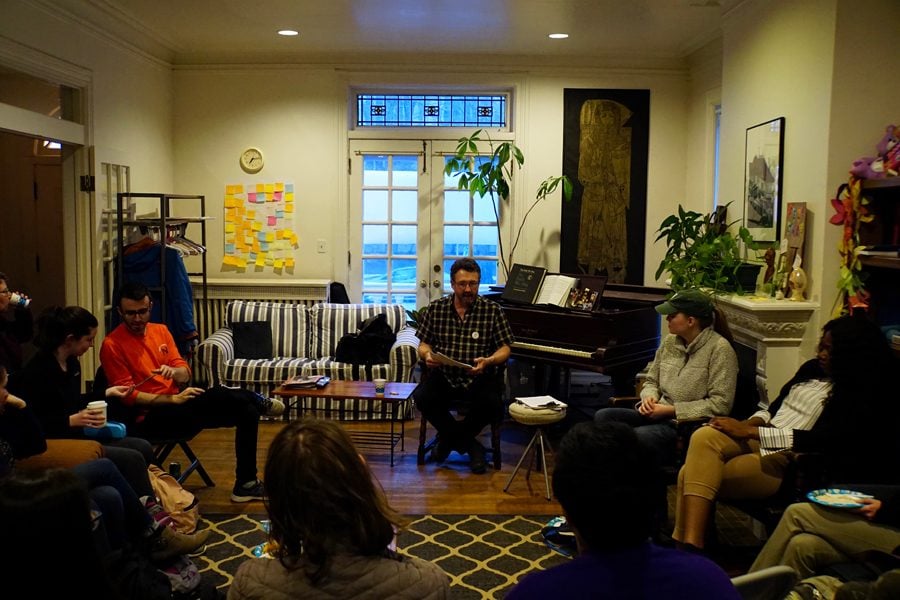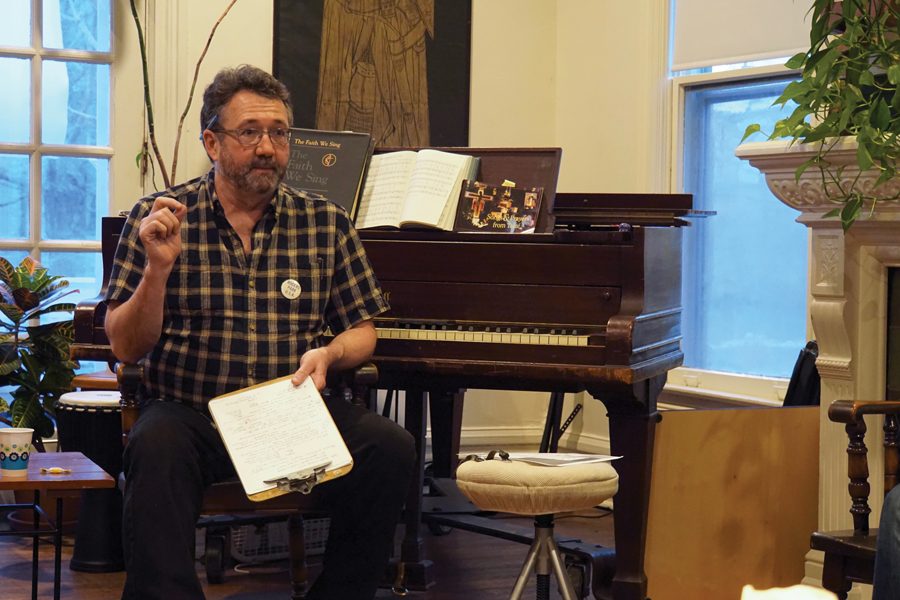Weinberg Prof. Bill Savage talks gentrification in Rogers Park, social justice at community event
Owen Stidman/The Daily Northwestern
Weinberg Prof. Bill Savage spoke to a crowd of students. He gave a talk Thursday about gentrification and his experiences as a Rogers Park native.
April 12, 2019
Bill Savage has rented and lived in Rogers Park for the past 55 years, but when he made the decision to become a homeowner, a question dawned on him: “Am I gentrifying Rogers Park?”
The Weinberg professor spoke Wednesday to a group of about 20 students in this month’s installment of Justice Talks, a monthly dialogue hosted by Northwestern’s Neighbor2Neighbor Initiative to foster conversations about social issues.
Savage explained that gentrification is the process by which people — usually hailing from high-income backgrounds — purchase houses or condominiums in predominantly rent-based neighborhoods, thus driving out lower-income renters. He said that in Chicago, the issue has become a major concern.
Savage framed the dialogue through the lens of his own personal experiences. He’s spent his whole life in Rogers Park, moving between houses and apartments eight times. Savage said the past two residences he’s lived in have been located near Loyola University Chicago, in an area that has faced massive change over the past few decades.
“One of the things that people forget about gentrification and about urban renewal is how often universities are the motors of that,” Savage said.
Some schools, like the University of Chicago, heavily promote ways for students to get involved in their neighboring communities — in this case, Hyde Park — said Val Buchanan, assistant director of leadership development and community engagement at the University.
Buchanan, who organizes the Justice Talks’ dialogues, said while Neighbor2Neighbor and other initiatives promote city involvement, Northwestern has not yet organized engagement to UChicago’s level.
“I think we have a lot of work to do in terms of our connection to Evanston,” Buchanan said. “The undergraduate experience tends to be very campus-centric. There’s not a lot of pathways to understand and connect with community-based organizations and get involved with their neighbors in Evanston as a whole. For many Northwestern students, they’re on Sherman Avenue, campus, and that’s it — and that’s not true of Evanston.”

“Be a neighborly person,” Prof. Bill Savage said.
During the talk, Savage asked the crowd of students to consider their effects when moving into a new neighborhood. He advised students to take a walk through the neighborhood before deciding to rent and said it’s important to check out how old the businesses are — if they’re all under five years old, then that might be a sign of gentrification.
“Be a neighborly person, wherever you go, and you’re going to have a richer experience even if you end up finding out that five years later, you’re considered the first gentrifier,” Savage said. “In those five years, get to know your neighbors. Maybe it won’t feel quite so bad.”
Weinberg sophomore Katie Daehler, who attended the event, said that while the gentrification conversation usually is focused on its effects in Chicago, Evanston and Northwestern have a role in it as well.
“It’s really easy to just look at the price of a place and look at its location be like, ‘Oh, hey, that’s pretty great,’” Daehler said. “But in reality, the decisions you’re making have a lot more weight to them.”
Twitter: @awstinbenavides
Email: austinbenavides2022@u.northwestern.edu



